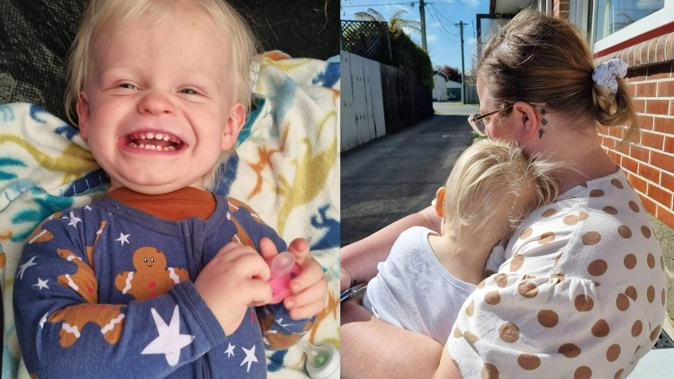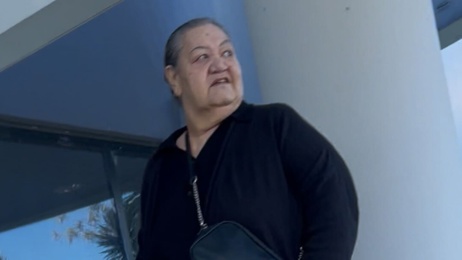
Little Alfie McSaveney is a two-year-old with an infectious giggle, a “sassy side-eye”, and a love of music.
He was also born with a rare genetic disorder called FOXG1, a gene mutation which means his development is delayed. He has daily seizures that don’t respond well to medication, doesn’t speak or walk, and needs a feeding tube to eat, as well as round-the-clock care.
His mum Lu McSaveney, 28, says “it’s been a hell of a long journey”, but an intensive therapy programme available in Australia could potentially change his life.
Two-year-old Alfie loves music and being around other kids. Photo / Supplied
The three-week intensive could see the two-year-old, who’s been turned down by five preschools due to “safety issues”, learn to walk and communicate with others.
It’s something that the Selwyn-based single mum, living on a benefit as she has to care for her child 24/7, can’t access without help - and now she’s hoping a Givealittle can help her raise the $20,000 she needs to get him there.
Speaking to the Herald, McSaveney says raising Alfie so far has meant “everything is a battle”.
“I try not to focus on the bad things, because it’s very easy to get yourself in this mentality of like, ‘this life is too difficult’,” she explains.
“So it’s been hard to sit down and tell people, ‘this is where he struggles’, because I try to not really dwell on that.”
Little Alfie is an “absolute delight of a little kid”, his mum says, but he’s had to work so much harder for things that come naturally to others.
“Just all those little things that people with typically developing children don’t even have to think about. He doesn’t interact with toys in the way that a two-year-old might, like, he doesn’t pick up a ball and put it in a hoop or any of that kind of stuff. He’s more where a nine to 12-month-old would be, you know, hitting a button to make a noise. He loves music, anything that makes a noise, anything that gives him feedback.”
Every child born with the condition is different, she explains - meaning it’s difficult to find people who can relate, or offer advice or input. She’s part of an “amazing” Facebook group of families with FOXG1 kids around the world, and knows of at least two other Kiwi kids with the condition, but their journeys have been “completely different” to Alfie’s.
“Every kid is so vastly different that what works for one doesn’t necessarily always work for any other kid.”
Little Alfie McSaveney was born with FOXG1, a rare genetic disorder that delays development. Photo / Supplied
‘I couldn’t not try’
McSaveney says the help Alfie already receives through EIS (early intervention specialist care) has been “amazing”, but it’s not enough.
“I can’t sing their praises high enough for all the support and help that they give not only Alfie, but me as well. He’s learnt to roll, to sit, to interact with toys, track noise and movement and to look and observe people.”
But she notes that’s just an hour a week in total of therapy, including physio, speech and language therapy, and development teaching - and in New Zealand, “the funding is just not there” for more.
So when she heard about the therapy programme available at the NAPA clinic in Sydney, which offers four hours a day of treatment for 15 days, she saw an opportunity to improve his quality of life.
“I’ve seen some kids going in unable to crawl or sit and coming out being able to stand unassisted, some really drastic changes,” she shares.
When a young child isn’t walking or crawling, it affects their hip development and bone structure. Alfie doesn’t stand correctly, causing him “a lot of pain”.
“Having him happily standing can change his quality of life because it’s less painful and he’s not going to have so much bone pain or muscle pain as he gets older. It’s also things like being able to communicate. I can pick up on his cues because I know him so well, but I can’t teach other people that. It’s not fair for him to be doing his cues of ‘I want a bottle’, or ‘I want a cuddle’, and that person isn’t able to pick up on it because he can’t say those words.”
So McSaveney spoke to Alfie’s specialists, weighed up the pros and cons, and decided she “couldn’t not try”.
“I couldn’t not give him this opportunity to see if this is helpful for him. I wouldn’t be able to cope if we never did it, knowing in the back of my mind, this could have been a thing that helped us.”
If they raise enough funds to get there, the mum of one says she “wouldn’t be able to express how grateful I would be for the opportunity.
“It’s so heartbreaking as a mum, knowing that there’s something available that could potentially help him gain a bit of independence and better quality of life,” she reveals, holding back tears.
“But I can’t give that to him, because I’m a solo parent on the benefit, unable to afford the $12,000 just for the programme, let alone the travel and all the other expenses that come with having to go overseas.”
Lu McSaveney says it's "a delight" being Alfie's mum. Photo / Supplied
‘The bigger picture’
For McSaveney, it’s not just about Alfie.
“I need to fight harder for things like this to be in New Zealand, and fight for other children to be able to access this,” she says.
“Right now might be about Alfie, but the bigger picture is the fight for other children in New Zealand and babies to be born who are going to have disabilities.
“It’s not as simple as just saying the funding structure needs to change. It’s another thing to then find people to give the service, we need the experts as well. And that’s going to take years of training people actually wanting to do that kind of role. There’s such a shortage of workers, let alone the funding - the funding is just one piece of the puzzle. There needs to be a shift in how we include disabled children and disabled adults in our society.”
Alfie has already been turned down by five preschools citing “safety issues” because he needs constant care.
“I’ve had so many preschools say that once he turns three we can access the one-on-one caring, but that’s only 10 or 12 hours a week. He would thrive in a preschool environment, he loves children,” she says, adding that having him in preschool for even one day a week would make a huge difference to her own wellbeing.
“I need that consistent day where I can have an appointment for myself without having to stress. Your emotional and physical capacity is taken over with trying to get everything you need for your child.
“It’s people’s lives, and people forget that this is my life, day in, day out. And just because I’m having a good day one day, it doesn’t mean the next day is not a fight for access to something.”
But through it all, McSaveney has learned to acknowledge that Alfie’s care is both hard work and an utter joy.
“I love my child, he’s a delight,” she gushes.
“He’s the master of the side eye, the cheekiest little grin. He’s a joy. Hard work, but it doesn’t take away from the joy. I’ve definitely learned to live with both ... it’s a delight being his mum.”
You can donate to Alfie’s Givealittle here.
Take your Radio, Podcasts and Music with you

/cloudfront-ap-southeast-2.images.arcpublishing.com/nzme/GCQAYEBFCVE7XEF7CDTLSIXNZE.PNG)
/cloudfront-ap-southeast-2.images.arcpublishing.com/nzme/E4FTXHUARZHE3LFSVYXEYOY734.PNG)
/cloudfront-ap-southeast-2.images.arcpublishing.com/nzme/GS422CRVAVDCNACRXQOWWUV5SY.PNG)








